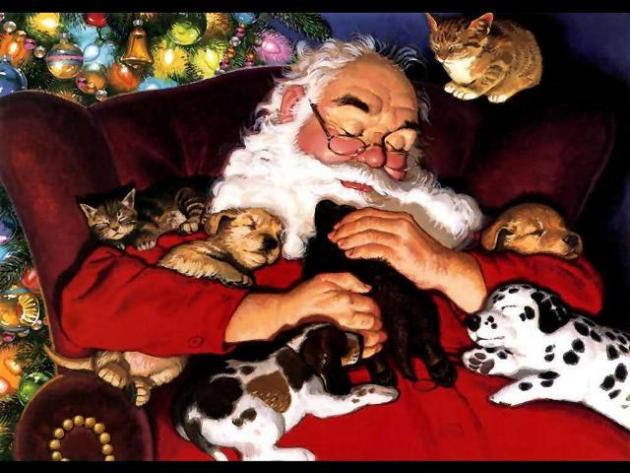Heritage Animal Hospital: Holidays and Pets
Dear Clients and Friends,
The holiday season has now arrived! With the holidays come food, decorations, and sharing. The holidays are a time for giving, but they also can be hazardous to your pet’s health. A little precaution will help make the holiday season a happy time for everyone. Since we are dedicated to providing the best veterinary care to your furry family members, we have compiled this letter to get you through a safe and happy season.
One of the dangers of the holidays is food.
We see many upset stomachs when our pets get delicious treats that they aren’t used to enjoying. These foods include, but are not limited to; ham, turkey, gravy, chocolate, and bones. These foods can lead to medical problems such as pancreatitis, a painful and often fatal inflammation of the pancreas. Turkey, chicken, and other rib bones have a tendency to splinter easily. These splinters can create holes along the intestinal tract that may result in your pet needing an emergency surgical procedure. Fats, gravies, and poultry skin can cause severe gastrointestinal problems as well.

Some plants that are common around the holidays can be dangerous as well. Mistletoe, holly, poinsettias, lilies, azaleas, amaryllis, and cyclamen certainly make great additions to holiday décor, but they can be poisonous to your pet. Artificial plants make a great alternative, even during the holiday season! Besides plants, other decorations can pose a threat during the holidays.

Dogs and cats love to eat tinsel, bows, streamers, lights, ornaments, and wrapping paper. However, their bodies cannot break down these substances, and they can form blockages in the intestinal tract.

Chewing on light and electrical cords, besides being a fire hazard, can shock or burn your pet. Place small and fragile ornaments high up on the tree, and be sure all electrical cords are secure and out of your pet’s way. Garland, tinsel, and ribbons can get caught in your pet’s throat, so make sure they are out of reach. Fresh tree branches and pine needles smell great, but they can be toxic to your pet. Ingested pine needles can puncture your pet’s intestines. Small toys present the same dangers to your pets as they would to your children, but keep in mind that large toys are dangerous too if your pet can rip them apart.

We all love to light candles this time of year and this is yet another area where you must exercise caution. Lit candles produce fumes that can be harmful if inhaled, especially where birds are concerned. A wagging tail can easily knock a candle over, resulting in a dangerous situation to everyone in the home. Potpourri presents a danger if your pet eats it from a decorative bowl or pot.
More and more holiday presents require batteries in this day and age. Loose batteries and packages with batteries in them are becoming increasingly common, and it’s very important that these are kept our of your pet’s reach. Batteries contain corrosives, and if they are bitten or swallowed they can result in ulceration in you pet’s mouth, tongue, and entire gastrointestinal tract.
Of course, with the holiday season comes an increase in the amount of trash in the home. As a precaution, make sure trash is properly disposed of and can’t be knocked over. Also be aware that many pets love to drink the water under the Christmas tree. It’s best to use a suga water mix rather than chemicals. If you have cats, it’s best to tie your tree down, as to them the tree is a new place to climb.
We highly recommend that you don’t leave your pet home alone for an extended period of time. If you are going to be traveling during the holidays, make arrangements for friends or family to look after your pet. The caretaker will need to know how to feed your pet, as well as how to walk them if necessary. They will also need to know that part of the responsibility includes checking on them regularly. Still, a better option may be to board your pet.
If you will be home this holiday season, you will want to take some precautions when entertaining guests. If your pet is excitable, keep them away from the door, and if possible, out of hearing range of a constantly ringing doorbell. Put your pet in a room where there is less noise and a less disturbing level of activity. A frightened or upset pet may try to run out the door during what will be a very confusing time for them.
Finally, we need to bring to your attention the dangers of salmonella food
poisoning. We all like to enjoy turkey this time of year, but many people aren’t aware that their pets are at risk when they eat the leftovers. Salmonella is an organism that lives in the intestinal tract of a turkey. While the cooking process usually destroys the organism, a large turkey full of stuffing may be undercooked in its center. If the turkey remains at room temperature for a long period of time, salmonella organisms can multiply, causing contamination. Your pet can become poisoned if they eat any of the turkey that has been left out. Symptoms of Salmonella poisoning include vomiting, diarrhea, loss of appetite, listlessness, depression, and a high temperature.
These are just a few examples of the most common dangers that arise during the holiday season. Remember, as much as we enjoy the holidays, there are dangers involved and we must remain cautious. We hope this letter will provide you with some tips and will help prevent some accidents from occurring. If you do see your pet having diarrhea, vomiting, or if they otherwise seem injured, lethargic, or unhealthy, please give us a call.
From our family to yours, Have a safe and happy holiday season!
Sincerely,
The Staff of Heritage Animal Hospital
- Log in to post comments



























